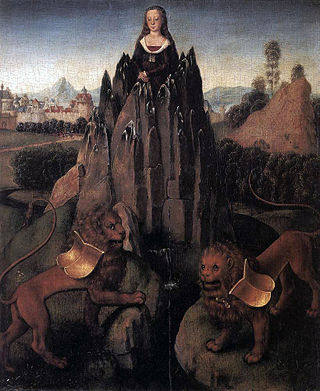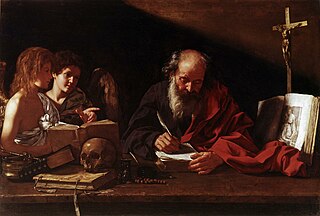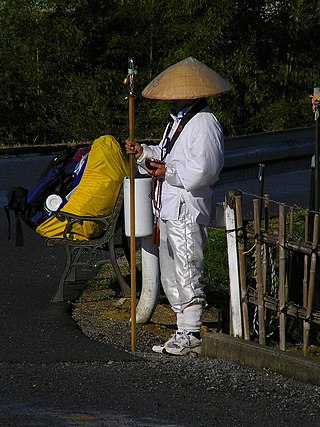Anthony the Great was a Christian monk from Egypt, revered since his death as a saint. He is distinguished from other saints named Anthony, such as Anthony of Padua, by various epithets: Anthony of Egypt, Anthony the Abbot, Anthony of the Desert, Anthony the Anchorite, Anthony the Hermit, and Anthony of Thebes. For his importance among the Desert Fathers and to all later Christian monasticism, he is also known as the Father of All Monks. His feast day is celebrated on 17 January among the Eastern Orthodox and Catholic churches and on Tobi 22 in the Coptic calendar.

Chastity, also known as purity, is a virtue related to temperance. Someone who is chaste refrains either from sexual activity that is considered immoral or from any sexual activity, according to their state of life. In some contexts, for example when making a vow of chastity, chastity means the same as celibacy.

John Climacus, also known as John of the Ladder, John Scholasticus and John Sinaites, was a 6th–7th-century Christian monk at the monastery on Mount Sinai. He is revered as a saint by the Eastern Orthodox Church and Roman Catholic Church.
Monasticism, also referred to as monachism, or monkhood, is a religious way of life in which one renounces worldly pursuits to devote oneself fully to spiritual work. Monastic life plays an important role in many Christian churches, especially in the Catholic, Orthodox and Anglican traditions as well as in other faiths such as Buddhism, Hinduism and Jainism. In other religions, monasticism is criticized and not practiced, as in Islam and Zoroastrianism, or plays a marginal role, as in modern Judaism. Many monastics live in abbeys, convents, monasteries or priories to separate themselves from the secular world, unless they are in mendicant or missionary orders.

Asceticism is a lifestyle characterized by abstinence from sensual pleasures, often for the purpose of pursuing spiritual goals. Ascetics may withdraw from the world for their practices or continue to be part of their society, but typically adopt a frugal lifestyle, characterised by the renunciation of material possessions and physical pleasures, and also spend time fasting while concentrating on the practice of religion or reflection upon spiritual matters. Various individuals have also attempted an ascetic lifestyle to free themselves from addictions, some of them particular to modern life, such as alcohol, tobacco, drugs, entertainment, sex, food, meat etc.

A hermit, also known as an eremite or solitary, is a person who lives in seclusion. Eremitism plays a role in a variety of religions.

In Christianity, an anchorite or anchoret is someone who, for religious reasons, withdraws from secular society to be able to lead an intensely prayer-orientated, ascetic, or Eucharist-focused life. While anchorites are frequently considered to be a type of hermit, unlike hermits they were required to take a vow of stability of place, opting for permanent enclosure in cells often attached to churches. Also unlike hermits, anchorites were subject to a religious rite of consecration that closely resembled the funeral rite, following which they would be considered dead to the world and a type of living saint. Anchorites had a certain autonomy, as they did not answer to any ecclesiastical authority other than the bishop.
Saint Simeon, Saint Symeon or Saint-Siméon may refer to:

Sannyasa, sometimes spelled Sanyasa or Sanyasi, is life of renunciation and the fourth stage within the Hindu system of four life stages known as Ashramas, with the first three being Brahmacharya, Grihastha (householder) and Vanaprastha. Sannyasa is traditionally conceptualized for men or women in late years of their life, but young brahmacharis have had the choice to skip the householder and retirement stages, renounce worldly and materialistic pursuits and dedicate their lives to spiritual pursuits.
The Philokalia is "a collection of texts written between the 4th and 15th centuries by spiritual masters" of the mystical hesychast tradition of the Eastern Orthodox Church. They were originally written for the guidance and instruction of monks in "the practice of the contemplative life". The collection was compiled in the 18th century by Nicodemus the Hagiorite and Macarius of Corinth based on the codices 472, 605, 476, 628 and 629 from the library of the monastery of Vatopedi, Mount Athos.

A monk is a person who practices religious asceticism by living a monastic lifestyle, either alone or with any number of other monks. A monk may be a person who decides to dedicate their life to serving other people and serving God, or to be an ascetic who voluntarily chooses to leave mainstream society and live their life in prayer and contemplation. The concept is ancient and can be seen in many religions and in philosophy.

A mendicant is one who practices mendicancy, relying chiefly or exclusively on alms to survive. In principle, mendicant religious orders own little property, either individually or collectively, and in many instances members have taken a vow of poverty, in order that all their time and energy could be expended on practicing their respective faith, preaching and serving society.

Saint Macarius of Alexandria was a monk in the Nitrian Desert. He was a slightly younger contemporary of Macarius of Egypt, and is thus also known as Macarius the Younger.

Christian monasticism is the devotional practice of Christians who live ascetic and typically cloistered lives that are dedicated to Christian worship. It began to develop early in the history of the Christian Church, modeled upon scriptural examples and ideals, including those in the Old Testament, but was not mandated as an institution in the scriptures. It has come to be regulated by religious rules and, in modern times, the Canon law of the respective Christian denominations that have forms of monastic living. Those living the monastic life are known by the generic terms monks (men) and nuns (women). The word monk originated from the Greek μοναχός, itself from μόνος meaning 'alone'.

Cenobiticmonasticism is a monastic tradition that stresses community life. Often in the West the community belongs to a religious order, and the life of the cenobitic monk is regulated by a religious rule, a collection of precepts. The older style of monasticism, to live as a hermit, is called eremitic. A third form of monasticism, found primarily in Eastern Christianity, is the skete.

John Cassian, also known as John the Ascetic and John Cassian the Roman, was a Christian monk and theologian celebrated in both the Western and Eastern churches for his mystical writings. Cassian is noted for his role in bringing the ideas and practices of early Christian monasticism to the medieval West.

The Desert Fathers or Desert Monks were early Christian hermits and ascetics, who lived primarily in the Scetes desert of the Roman province of Egypt, beginning around the third century AD. The Apophthegmata Patrum is a collection of the wisdom of some of the early desert monks and nuns, in print as Sayings of the Desert Fathers. The first Desert Father was Paul of Thebes, and the most well known was Anthony the Great, who moved to the desert in AD 270–271 and became known as both the father and founder of desert monasticism. By the time Anthony had died in AD 356, thousands of monks and nuns had been drawn to living in the desert following Anthony's example, leading his biographer, Athanasius of Alexandria, to write that "the desert had become a city." The Desert Fathers had a major influence on the development of Christianity.

A recluse is a person who lives in voluntary seclusion and solitude. The word is from the Latin recludere, which means "shut up" or "sequester".

Abba Poemen the Great was a Christian monk and early Desert Father who is the most quoted Abba (Father) in the Apophthegmata Patrum. Abba Poemen was quoted most often for his gift as a spiritual guide, reflected in the name "Poemen" ("Shepherd"), rather than for his asceticism. He is considered a saint in Eastern Christianity. His feast day is August 27 in the Julian calendar.

Chariton the Confessor was an early Christian monk. He is venerated as a saint by both the Western and Eastern Churches. His remembrance day is September 28.